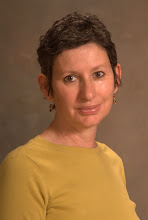Tis the season for shopping, and I've been out seeing which oncologist was the best fit. Reader Warning: What follows is overly detailed, potentially boring, and embarrassingly self-absorbed. But it's my blog, so I've indulged myself. If you can bear with it, the comparative details show why doctor-shopping, if your insurance allows it, is a good idea.
Report on Oncologists
Dr. #1: A 35-year-old Asian woman practicing in a satellite office of a large oncology group. Presents as capable and concerned.
Opening move: Provided a detailed summary of my health history.
Analysis of my case: Even though this cancer is only Stage I, she strongly recommends chemo because of the disease's aggressive make-up. When asked about the 15% estrogen-receptor positive thing, she noted that this number was low, making me almost a "triple negative." This means that I was nearly negative for estrogen and also negative for progesterone and Her/2. She characterized a triple negative as bad, because doctors don't really know the cause of the disease or how best to attack it. Thus, she advises nuclear warfare, in the form of a witch's brew of chemo drugs.
Key talking points: Many brutal side effects accompany chemo, which she discussed in copious detail. But she and her team will help to mitigate them with other drugs.
Opinion on the close margins: Surgically re-excise now to remove any remaining pre-cancer before chemo begins. Don't rely on extra doses of radiation to fix the margins, which she considers too close for comfort.
View on hormone suppressants: Yes, after chemo and radiation are finished.
Surprise recommendation: Get a $3000 genetic test that will determine the presence of the breast cancer genes, even though I have no family history and fall outside of any genetically pre-disposed ethnic group. This test will reveal if my offspring are predisposed to breast cancer, and I will know how vigorously to pursue future testing for ovarian cancer.
Suggestions for my long-term overall health: Other than the genetic test, she didn't offer any.
Impression: While Dr. #1 was sincere, she was a conservative thinker. Possibly because she's a relatively young doctor, she relied on a textbook approach. I found her likable, but she also imparted a feeling of dread. This ominous mood was reinforced by the storm clouds that moved in during my appointment. This was an unusually foreboding afternoon for Southern California.
Dr. #2: A 40-something Latin American, who has retained much of his Spanish accent, practicing out of the Breast Center of USC/Norris. Presents as personable and engaging.
Opening move: Asked if I had any questions and wanted to know my general thoughts about chemo.
Analysis of my case: Before deciding about next steps, he recommends ordering a $3000 test called the Oncotype Dx, (this is different from the test that Dr. #1 suggests), which analyzes my excised tissues and provides a recurrence score. Studies show that patients with a low recurrence score don't benefit from chemo.
Key talking points: Brought visuals for me to take home and study. He had entered my parameters into a computer model that calculated risk of recurrence based on several post-surgical approaches, including no further treatment, treatment with only hormone suppressants and radiation, and treatment with newer chemo drugs.
Opinion on the close margins: Very comfortable with higher doses of radiation. Saw no need to re-excise.
View on hormone suppressants: Believes that a 15% estrogen number is not to be discounted. Said that too much estrogen is a factor here and that a hormone suppressant is the "cornerstone" of the treatment. Wants this treatment to begin either immediately, or when chemo ends.
Surprise recommendation: Suggests participating in a clinical trial to study the impact of osteoporosis drugs on breast cancer reduction. A long-term study in Europe showed that an osteoporosis drug also helped to reduce breast cancer recurrence. The FDA, not trusting the Europeans, wanted an American trial.
Suggestions for my long-term overall health: Sees a measurable benefit in a low-fat diet for breast cancer patients and recommends meeting with the staff nutritionist.
Impression: Provided the right balance of statistical analysis with a holistic approach. Also displayed a familiarity with European approaches, which was a plus. Had a cheerful disposition and a certain brightness about him. The previous day's storm clouds were still overhead, but I had shaken off the dread.
Dr. #3: Cancelling him and going with Dr. #2.
12/21/07
Subscribe to:
Post Comments (Atom)





1 comment:
Hi, CW. No need to respond publicly to this, but I was wondering, do you know which osteoporosis drug is involved in the clinical study? I know VERY LITTLE about them but am aware that there are some really scary o. drugs out there. I know you'll be all over it, but proceed with caution. Glad you found your oncologist. I like it that he's into the nutritional angle. I personally believe that, while not a panacea, it is an absolutely essential component of any treatment program. -BD
Post a Comment